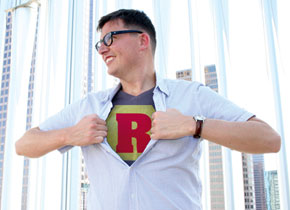Gay playwright and comic book author Roberto Aguirre-Sacasa puts a queer twist on comicdom’s straightest superhero with his adaptation of the ’60s musical ‘It’s a Bird… It’s a Plane… It’s Superman’
ARNOLD WAYNE JONES | Life+Style Editor jones@dallasvoice.com

TRUTH, JUSTICE AND THE AMERICAN WAY Roberto Aguirre-Sacasa transforms from mild-mannered comic book author to rockin’ musical playwright atop the Wyly Theatre as his ‘Superman’ adaptation enters previews this week. (Arnold Wayne Jones/Dallas Voice)
IT’S A BIRD… SUPERMAN
Wyly Theatre, 2400 Flora St.
Through June 18–July 25 in previews through June 24).
$15–$78. ATTPAC.org.
Roberto Aguirre-Sacasa, like most gay men, knows something about having a secret identity. Although he grew up with worldly parents who had an appreciation for musical theater (he would listen to their cast recordings of Hair and Man of La Mancha), Aguirre-Sacasa tried to hide from them his own favorite showtunes from the first album he ever bought: The Rocky Horror Picture Show soundtrack.
“It felt sometimes like when ‘Sweet Transvestite’ and ‘Toucha-a Touch-a, Touch Me’ were playing, that’s when my parents would come into the room,” he now confesses.
But while his alter ego (gay theater queen) was finally revealed, it all worked out for the best: Aguirre-Sacasa became a respected playwright and TV writer (Big Love), as well as comic book author of one of the Spider-Man imprints. And now he’s combining those passions, adapting the 1960s musical It’s a Bird… It’s a Plane… It’s Superman for the Dallas Theater Center.
While he’s best known for his work on Marvel Comics, it’s difficult not to see the physical similarities between Aguirre-Sacasa and the fictional DC superhero’s own alter ego. He’s tall and seems born to wear the mantle “mild-mannered;” he even sports the same boxy black rim eyeglasses as Clark Kent. Could he be hiding something under that button-down?
Nah.
“I did not pick the glasses because they were Clark Kent’s, but I definitely was aware that they were Clark Kent glasses,” he says. “It’s more that I’m hard to satisfy.”
Despite closeted gay kids finding solace in parallels between superhero comics and their own dual identities, Aguirre-Sacasa resists pop psychologizing about his motivations and how — if at all — his personality winds its way into his comic book work … or his stage adaptation of a cartoon ubermensch.
“I get that, absolutely, but for me it’s hard to reconcile,” he says. “I feel Superman is the straightest of superheroes; and I first worked on the Fantastic Four, also the straightest in the Marvel universe” — despite the fact, he acknowledges, that one of the Four’s signature phrase is “Flame on!” “But I don’t say, ‘Oh, I’m attracted to the comic books because they allow me to play out subtextual symbolism.’ I do know I have gay fans — I’ve met both of them,” he jokes. “But it’s not something I am conscious of in my work.”
Nevertheless, he has brought an undeniable gay sensibility to this Superman adaptation, with lesbian characters and a *sigh* factor to the hunky Man of Steel, played by Matt Cavenaugh.
And he was definitely conscious of turning Superman into an old-fashioned musical comedy, the kind that will make people say, “They don’t do ’em like that anymore.”
“I do feel superpowers are larger than life — a quite natural fit to musical theater,” says Aguirre-Sacasa.
Still, fitting the very ‘60s-era musical into a post-modern world familiar with decades of superhero culture was daunting. Aguirre-Sacasa grew up listening to (and enjoying) the original Broadway cast recording, but the songs were all he heard; he hadn’t read the script until he saw a staged reading a few years ago.
“It was very jokey — just skits strung together. That was the driving impulse. Character was sacrificed at the expense of the material. Who Superman was — honest, patriotic — was a joke. It was very tonally different from the first two Superman movies; more like the third one,” he says.
Aguirre-Sacasa — and for that matter Kevin Moriarty, the artistic director of the DTC and a superhero-obsessed overgrown kid — wanted something that would fit within the contemporary construct. The original authors (including Waxahachie-bred co-author Robert Benton) gave their blessing for a re-imagining of the book.
Aguirre-Sacasa streamlined the multitude of romantic subplots in the original and let them fall in expected ways (Superman with Lois Lane, for instance) and gave more stage time to editor Perry White. Among the biggest challenges: A more legitimate opponent for Superman.
“One of the tricky things was to have a worthy villain,” he says. “Max Menken and Dr. Segdwick [the bad guys in the original script] didn’t really work together until the second half of Act 2. Our Max is more like the industrialist in Iron Man, like Al Capone.”
But, he admits, still no Lex Luthor. What gives?
A couple of things prevented that, mostly the idea that “Lex Luthor just wouldn’t sing. And making Max formidable was real attractive to me.”
Shoe-horning the existing songs into his new script was another feat.
“There was not a lot of Superman singing, and not a lot specific to Superman” in the original score, Aguirre-Sacasa notes.
The songs did get restructured, and there has been additional tweaking and reshuffling, including commissioning four original composers Charles Strouse and Lee Adams to write four new songs. But in his original draft, Aguirre-Sacasa “pretty much followed the score structure, though I didn’t think they had to be sung by the same characters.” That meant in one instance swapping the lyrics in a duet, so Clark gets to sing the woman’s part.
That made me wonder: Just how gay will this production be? I mean, other than being a musical with a hot guy in tights?
Well, that’s what’s called a cliffhanger. Tune in to find out.
This article appeared in the National Pride edition in the Dallas Voice print edition June 18, 2010.













